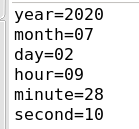下面是我查资料找到的我认为好用的两种方式,区别在于对localtime(&t)函数返回值的处理上。
我做成了getYear()和getMonth()函数,方便自己随时调用。
方法一:利用strftime()函数
strftime( ) 函数说明参考:https://blog.csdn.net/SanQi_Abao/article/details/94964665
可以获取的时间种类很多,这里只实现部分。
#include <iostream>
#include <cstdio>
#include <cmath>
using namespace std;
static string getYear() {
time_t t = time(NULL);
char ch[6] = { 0 };
strftime(ch, sizeof(ch) - 1, "%Y", localtime(&t));
return ch;
}
static string getMonth() {
time_t t = time(NULL);
char ch[4] = { 0 };
strftime(ch, sizeof(ch) - 1, "%m", localtime(&t));
return ch;
}
static string getDay() {
time_t t = time(NULL);
char ch[4] = { };
strftime(ch, sizeof(ch) - 1, "%d", localtime(&t));
return ch;
}
static string getHour() {
time_t t = time(NULL);
char ch[4] = { 0 };
strftime(ch, sizeof(ch) - 1, "%H", localtime(&t));
return ch;
}
static string getMinute() {
time_t t = time(NULL);
char ch[4] = { 0 };
strftime(ch, sizeof(ch) - 1, "%M", localtime(&t));
return ch;
}
static string getSecond() {
time_t t = time(NULL);
char ch[4] = { 0 };
strftime(ch, sizeof(ch) - 1, "%S", localtime(&t));
return ch;
}
int main() {
cout << "year=" << getYear() << endl;
cout << "month=" << getMonth() << endl;
cout << "day=" << getDay() << endl;
cout << "hour=" << getHour() << endl;
cout << "minute=" << getMinute() << endl;
cout << "second=" << getSecond() << endl;
return 0;
}

方法二:利用结构体tm
//结构体tm内的成员
int tm_sec; /* Seconds. [0-60] (1 leap second) */
int tm_min; /* Minutes. [0-59] */
int tm_hour; /* Hours. [0-23] */
int tm_mday; /* Day. [1-31] */
int tm_mon; /* Month. [0-11] */
int tm_year; /* Year - 1900. */
int tm_wday; /* Day of week. [0-6] */
int tm_yday; /* Days in year.[0-365] */
int tm_isdst; /* DST. [-1/0/1]*/
//看结构体成员就知道还能获取其他时间数据,我这里就不写全了
#include <iostream>
#include <cstdio>
#include <cmath>
using namespace std;
int getYear() {
time_t t;
time(&t);
struct tm* tmp = localtime(&t);
return tmp->tm_year + 1900;
}
int getMonth() {
time_t t;
time(&t);
struct tm* tmp = localtime(&t);
return tmp->tm_mon + 1;
}
int getDay() {
time_t t;
time(&t);
struct tm* tmp = localtime(&t);
return tmp->tm_mday;
}
int getHour() {
time_t t;
time(&t);
struct tm* tmp = localtime(&t);
return tmp->tm_hour;
}
int getMinute() {
time_t t;
time(&t);
struct tm* tmp = localtime(&t);
return tmp->tm_min;
}
int getSeond() {
time_t t;
time(&t);
struct tm* tmp = localtime(&t);
return tmp->tm_sec;
}
int main() {
printf("year=%d, month=%d, day=%d, hour=%d, second=%d\n", getYear(),
getMonth(), getDay(), getHour(), getSeond());
//year=2020, month=7, day=2, hour=9, second=3
}
========================================================
【文章为本人的学习笔记部分的分享,有任何错误地方欢迎评论指出,万分感谢!】
版权声明:本文为qq_46377483原创文章,遵循 CC 4.0 BY-SA 版权协议,转载请附上原文出处链接和本声明。